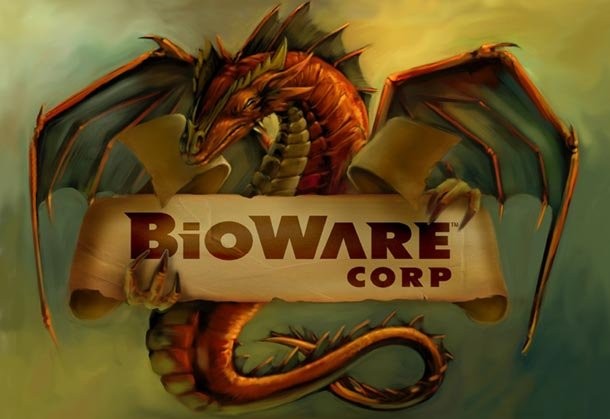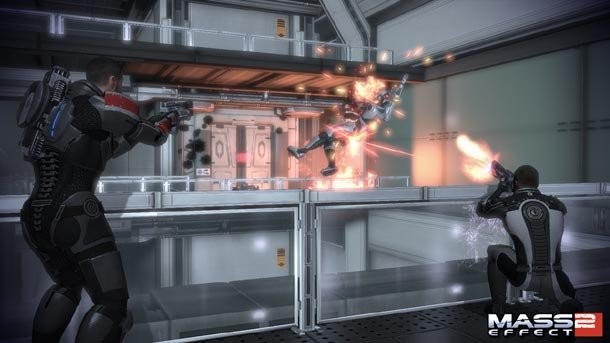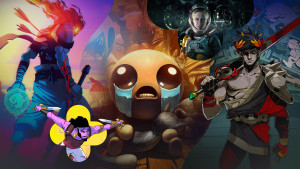Please support Game Informer. Print magazine subscriptions are less than $2 per issue
Talking IP With BioWare's MDs

For nearly 15 years Canadian development house BioWare has been releasing some of the most refreshing and innovation RPGs on the market. Next week the company releases its latest opus, Mass Effect 2. We figured now was the perfect time to question BioWare founder’s Ray Muzyka and Greg Zeschuk about the company’s history, their philosophy behind shaping a game’s story, and the possibility of Mass Effect games after the trilogy.
BioWare is a strong company name. People usually know what they’re getting into when the buy a BioWare game. How did you guys go about building up your brand?
Ray Muzyka & Greg Zeschuk: We’ve thought about branding in a few different ways over the past couple decades. First, with regard to BioWare’s studio brand, and going forward our brands within the RPG/MMO Group at EA, we’ve always strived to be polite and humble, yet aggressive and assertive in ensuring that the BioWare brand was associated with the quality games our teams work so hard to deliver. In our early years, before people had heard of BioWare, we often had to email press to ask for preview and review corrections in order to make sure our team was getting credit. There was never any malicious intent on anyone’s part, but 15 to 20 years ago the publishing companies were consistently the big name brands, and often got credit for games developed externally by companies just like ours. We were just doing our part to help educate people. After about five to 10 years of this, most of the press folks finally got the idea. From that point on generally most press remembered to cite BioWare as the developer on our games.
 |
 |
| Greg Zeschuk | Ray Muzyka |
It’s the point of a sequel to evolve past previous entries, but do you find it hard to take a series and have it continue to grow while still staying true to the original thesis?
We try to be very consistent and focused in our goals for all of our games, and one of the most important goals for a sequel is to understand what made the original game special and make sure that’s not removed or destroyed in the sequel – even as you try to improve what didn’t work that well. Figuring out which is which can be very challenging. Yet, even if you make a lot of changes you need to ensure you don’t break the experience. If your first game is commercially successful it usually makes sense to make an evolutionary game rather than a revolutionary game. We usually finish a game with some ideas and concepts on where it could go in the future, and a sequel allows us to pursue those objectives.
We’ve done multiple expansion packs and assisted on engine license project sequels developed by other developers, but Mass Effect 2 is the first sequel we’ve done ourselves since Baldur’s Gate II: Shadows of Amn, and we’ve been really excited about the opportunity to take a great game like the original Mass Effect and build something even more special in the sequel. We think we’ve managed to ensure that the spirit of the original is maintained. Mass Effect 2, like its predecessor, has great characters and emotionally engaging narrative, but it also has many greatly improved features – like the intensity of the action-shooter experience, the exploration and how well the uncharted worlds are integrated, the overall user interface, and many technical improvements like smoother texture loads and faster level loading.
You guys have always talked about Mass Effect being a trilogy, but do you think you’ll continue the series in some fashion even after this arc is finished?
Given the success of the original Mass Effect and the incredible anticipation for Mass Effect 2 it seems like a very safe bet that games set in the world of Mass Effect will be around for a while. Of course, we’re currently focused on successfully completing the trilogy (and, no real secret here, but the Mass Effect team has already planed out the next sequel in detail and has already starting to work on it) but we’re also starting to throw around ideas for future games in the Mass Effect universe.
How do you approaching maintaining an IP’s integrity when someone else is working on your property? Such as when Obsidian worked on the sequel to KOTOR, or when another writer comes on board to work on a novel for one of your IPs?
The easiest way to manage the process is a very clear, explicitly defined set of mutual goals, and frequent communication. We also have fairly expansive IP bibles for our games that we use both internally and externally to educate folks we’re working with about the property. These are actually quite a bit of fun to read as you see a lot of stuff that has never appeared directly in our games, but this kind of background is essential in creating a believable framework for our game worlds. It’s like an iceberg where you only see a small portion at the top but the portion beneath the waves provides a strong foundation and stability for what is surfaced to the player. These IP bibles also allow us to extend our games to ancillary products and sequels more easily.
Has your control over maintaining your IPs changed at all since getting on board with EA?
Working as part of EA has been great in developing our IPs overall as we’ve had more support in driving them to success than we’ve ever had in the past. For example, the excellent marketing and PR support we’ve received on both Dragon Age and Mass Effect 2 have been quite tremendous and beneficial. Additionally EA has a very strong philosophy for broad development, and we’ve got an internal business development team that partners with both folks from EA and external parties to bring our fans items like novels, comics, pen and paper games, figurines, and other ancillary products associated with our properties. We think all of these items increase the breadth and IP scope for our properties; they are something we really enjoy doing, and we think that our fans definitely appreciate them.

How do you guys approach fan feedback? Do you feel it’s dangerous to change a game too much based on feedback? Is there a risk that you might lose your original audience if you cater to those who didn’t like the first game in the first place?
We always take a very close look at fan and press feedback – and we simultaneously try to be balanced in how we do or don’t apply it. We usually have a pretty good idea about what was good and what wasn’t when we ship our games, though we are occasionally surprised with what comes up in the feedback from press and fans and other outside sources. But this can be a good thing – frank feedback is always good if you view it with humility and integrity.
In a couple of our sequels, Baldur’s Gate II and Mass Effect 2, the teams put together a complete list of fan feedback and reviewed it in excruciating detail. The result was a set of key data points that we considered carefully when planning our sequels. The important thing for us in this sort of process is to not exercise a panicked or knee-jerk reaction when looking at the feedback; the real value comes from understanding your game, understanding the feedback and carefully planning the sequel and developing a clear set of goals that balance your objectives and the fan and press’ perspectives.
One of the most interesting types of feedback we sometimes get is a summary dismissal of a game from a fan who’s played through the content multiple times, which as you know is a pretty big commitment considering the size of our games. We think that sort of feedback likely represents a bit of a love-hate relationship…but we certainly appreciate all our fans and we try our best to listen to them.
What do you think is more important for a game, setting or story? Many of your games have been set in fairly traditional fantasy settings, or a traditional sci-fi settings. Jade Empire stands out in that its setting was unique and largely untapped by the video game market. Why do you think so many games are set in fairly traditional settings, and what do you think is the risk in setting a game somewhere less mainstream?
We tend to focus first on setting and then on story and character, because the setting typically forms the foundation of the game, from which you can build the story, characters, art style, and so on; setting also dictates a lot about art style and also helps define the required technology, so you need to get started on that stuff early.
This next point is going to sound a bit odd and potentially a bit in conflict to the prior point, but it seems true: we think a good story can live in almost any setting. It seems like the common element of the best stories is that they are quintessentially human in some respect, and usually feature emotionally compelling stories (there are many different emotions of course, so stories can be incredibly varied in the way they impact the audience), and as long as you’ve got humans, or something that approximates humanity (as Avatar has taught us) you can develop a compelling story.
Finally, the answer to the last part of your question may be the most fairly straightforward: games that take place in exceedingly unusual settings generally have a greater risk of commercial failure. People seem to tend to like things that they are familiar with - and the further you go away from known territory, the greater the commercial danger. Unfortunately the result with some projects can sometimes seem to be rehashing the same old thing time and time again. New settings can work too of course – the key is retaining familiar elements even in the unfamiliar, and retaining emotionally compelling elements.
BioWare has always taken a mature approach to sex in games, but the public's reaction to this hadn’t always been as mature. What is your opinion on this?
We focus on delivering a tasteful but sometimes mature experience for our fans, and we try to enable meaningful choices in the content, to allow people to play them as a character role they are taking on in a roleplaying game. We don’t worry too much when people who haven’t played or experienced our games try and generate a false, inflammatory news story based on content taken well out of context. We try to consider the responses of real fans and we’re certainly never seeking to deliver gratuitous content. Emotionally engaging yes, but not gratuitous.
You are known in the industry as the doctors who decided to make games, but do you actually keep your medical licenses current?
Ray kept his license a little longer than Greg, but both of us have officially “retired” as doctors. Neither of us has worked as a doctor for nearly 10 years now, and neither of us will be going back to medicine any time soon; we’re having too much fun making games!










